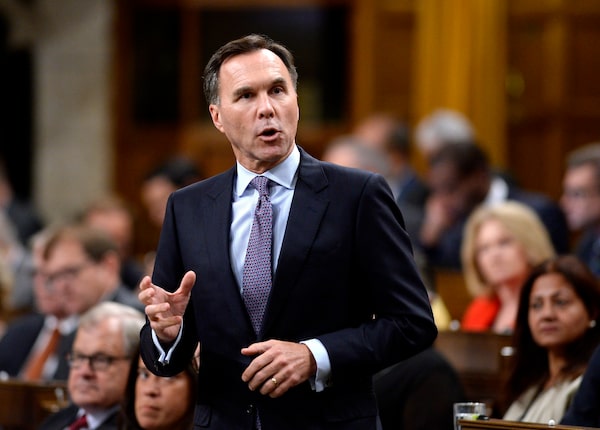Business groups are warning Finance Minister Bill Morneau that his plan for a fall update focused on boosting competitiveness is at risk of being undercut by other federal decisions that are driving up costs.
As a growing number of premiers side with critics of Ottawa’s plan to reduce greenhouse gas emissions, more provinces, and the businesses within them, will be subject to a new federal carbon tax as of Jan. 1. The tax will apply in provinces that have not already established a system to reduce greenhouse gas emissions that meets new national standards.
Ottawa has yet to announce how it will redistribute the carbon tax revenue, but the Trudeau cabinet is facing tough decisions this fall regarding the details of its carbon-pricing policy. Returning all of the money directly to voters may help the federal Liberals in an election year, but many business groups oppose such an approach due to it being unfair to the companies paying the tax.

Finance Minister Bill Morneau speaks during Question Period in the House of Commons on Parliament Hill in Ottawa on Sept. 24, 2018.Justin Tang/The Canadian Press
In addition, the start of 2019 is when workers and business owners will be required to pay higher Canada Pension Plan premiums as part of a deal that Mr. Morneau negotiated with the provinces in 2016 to enhance the retirement savings program.
These new costs for business come as Mr. Morneau is preparing to unveil a fall fiscal update that will outline Ottawa’s response to recent U.S. tax cuts, which erased Canada’s corporate tax advantage over the U.S. and prompted calls from business leaders for Ottawa to reduce costs for Canadian firms.
“Everybody’s fighting over their costs. There’s no doubt there’s an issue,” said Dave Sawyer, an environmental economist who recently authored a paper on various policy options for the federal carbon tax. “You’re trying to balance a bunch of balls and ultimately, we’ll see what choices they make.”
In his report for Canadians for Clean Prosperity, Mr. Sawyer said: “Our expectation is that competitiveness impacts would be somewhat exacerbated when carbon proceeds paid by business are given to households.”
A carbon tax involves raising money from businesses and consumers. Ottawa has said the tax will be revenue neutral for the federal government, meaning that all money raised will return to the province from which it was collected.
Aaron Henry, director of natural resources and environmental policy for the Canadian Chamber of Commerce, said many businesses support carbon pricing and believe a strong climate policy can co-exist with efforts to boost competitiveness. However, Mr. Henry said that the support may fade if businesses are forced to pay the tax without receiving any benefit in return through programs that help them reduce emissions.
“The reception [from business] might cool a little bit if it was the case that simply all the funds go into the individual pockets of Canadians,” he said. “That cheque [to voters] is a good way to ensure that carbon pricing survives the election … but long term, that’s not the best way to shore up Canadian competitiveness. Canadians would benefit more from actually seeing ourselves emerge as leaders in innovation and sustainability.”
The challenge for the Liberals is that Prime Minister Justin Trudeau’s policies on taxes and climate change are at odds with those of U.S. President Donald Trump, who cut business and personal taxes and pulled out of global efforts to reduce emissions.
For years, Canadian federal governments of various political stripes have produced and ultimately abandoned detailed climate change plans over concern that taking action that is out of step with the United States could make Canadian businesses less competitive.
Climate experts warned global leaders this month that time is running out. The United Nations Intergovernmental Panel on Climate Change said the world is failing in its effort to avert catastrophic climate change.
The federal government is still finalizing key features of the carbon tax, including how money will be rebated to households and how to allocate revenues paid out by the broader public sector, such as hospitals and schools, said a senior Liberal who was granted anonymity because they were not authorized to speak on the record. Municipalities, universities, schools and hospitals are exempt from the carbon tax on energy that they use to heat their buildings, but will pay as it becomes embedded in a wide range of goods and services.
The government is pursuing different approaches for four key sectors – individuals, the broader public sector, small businesses and large industry, the official said. It is also providing special breaks for energy-intensive industries that are exposed to foreign competition in order to encourage them to reduce emissions while protecting their competitiveness.
The official said that no final decisions have been made on how revenues from the carbon tax will be reimbursed.
Jeni Armstrong, a spokesperson for Mr. Morneau, declined to provide details on the government’s approach to carbon pricing, but said in an e-mail that it will be designed in a way that “reduces pollution, gives revenue back to Canadians and delivers the best economic outcomes.”
Ms. Armstrong said Canadians know pollution isn’t free.
“The cost is paid with droughts, floods, extreme weather events and our health,” she said.
Canadian Federation of Independent Business President Dan Kelly, who is calling on Ottawa to reconsider its climate plan, said small businesses will end up paying more and there is no sign that they will receive any benefit or compensation.
“The concern that we have is even a revenue-neutral carbon tax does not mean that it’s revenue neutral for everybody,” he said. “There are a lot of additional cost pressures. Competitiveness is eroding even more, and it’s more than just carbon taxes.”
 Bill Curry
Bill Curry